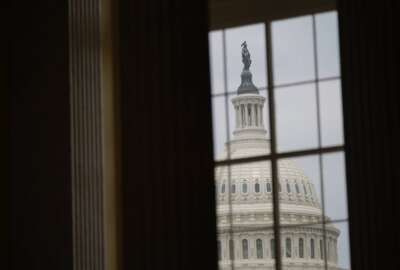- Republicans on the House Veterans Affairs Committee are tapping new leaders for its subcommittees. Congresswoman Mariannette Miller-Meeks (R-Iowa) will lead the subcommittee on health at a time when the VA is hiring tens of thousands of health care workers across the country. Congressman Matt Rosendale (R-Mont.) will serve on the Technology Modernization Subcommittee, which will oversee the VA’s rollout of a new Electronic Health Record system. Congresswoman Jen Kiggans (R-Va.) will lead the oversight and investigations subcommittee.
- A bill to return feds to the office is teed up for a House floor vote. The SHOW UP Act would return the federal workforce to pre-pandemic telework levels. Agencies would also have to study telework’s impact on productivity. Republicans in favor of the bill point to pandemic backlogs, saying they were caused by telework. But Democrats against the bill say telework improves federal recruitment, and helps agencies compete with the private sector. The House plans to vote on the SHOW UP Act this week. The Senate has not yet introduced a companion bill. (GOP bill to return feds to the office slated for House floor vote – Federal News Network)
- U.S. Citizenship and Immigration Services is developing a new hiring approach to help recruit and retain employees. That’s part of USCIS’s latest strategic plan, which puts a big focus on the workforce. The agency is re-engineering its training programs, and identifying additional opportunities for remote work and telework. The plan also involves developing a new employee engagement strategy at USCIS, and building out infrastructure to support diversity, equity, inclusion and accessibility.
- The Cybersecurity and Infrastructure Security Agency is putting a renewed focus behind supply chain security. CISA is establishing a new program for cyber-supply chain risk management. The agency is developing a training program and roundtables for feds, industry, and state and local governments. Agencies have been hit with numerous acquisition requirements and policies in recent years aimed at managing technology risks including software vulnerabilities, counterfeit electronics and foreign investment concerns. CISA is aiming to “operationalize” supply chain risk management policies with the new program. (CISA establishes new office to ‘operationalize’ supply chain security – Federal News Network)
- The Air force ordered a 90-day review of how well the department supports victims of domestic violence. An Air Force IG report found possible improper handling of domestic violence incidents. It cited a need for improvement in establishing trust and rapport with victims, particularly in the early stages of reporting. The effort will include partnering with outside organizations experienced in supporting military spouses and former military spouses who are domestic violence survivors. The Air Force recently established a “Connect to Care” approach outlining expectations for providing victim services.
- The Navy needs a few good sailors and Marines to produce and star in safety videos. The submissions should be between 12 to 60 seconds long and feature a message about operational safety in a format suitable for social media. The contest runs through October, and Navy Safety Command will recognize first, second and third place winners. The videos will be promoted across all the safety command’s social media platforms for thirty days and evaluated on the effectiveness of their engagement.
- A significant promotion for a longtime Navy IT leader. Jane Rathbun is now the principal deputy chief information officer for the Department of the Navy. Until now, she’s been serving as the DON’s chief technology officer and as a deputy assistant secretary for IT issues. The Navy said Rathbun was a driving force behind the “information superiority vision” it’s now using to guide its digital modernization efforts. The DON CIO’s deputy position has been vacant for several years.
- The National Science Foundation is rethinking the role of its chief information officer. NSF will establish a new Office of Business Information Technology Services that will be led by an executive who will be both the CIO and chief technology officer. The agency expects this new office will better integrate technology and mission areas. This decision comes after a recent analysis of NSF’s current set up found a lack of alignment between strategic goals and day to day operations. Current CIO Dorothy Aronson will remain a principal advisor to the agency’s director and other senior management on all matters involving IT. Applications to be the head of the new business IT services office are due by February 27.
- The Secret Service will have to wait a little bit longer to upgrade their virtual private networks, receive modern internet protocol service networks and non-Washington D.C. voice services. The Government Accountability Office upheld the protest of AT&T over a contract award to Lumen to provide these services. GAO found the Secret Service misevaluated AT&T’s proposal, which, in turn, left questions about whether the best-value decision was reasonable for this $28 million dollar contract. The Secret Service issued the task order under the Enterprise Infrastructure Solutions program. GAO recommended the Secret Service conduct a new best-value tradeoff determination and document the basis of its evaluation conclusions.
- A pandemic watchdog flags billions of dollars in potential fraud from programs offered by the Small Business Administration. The Pandemic Response Accountability Committee identified $5.4 billion in potentially fraudulent pandemic loans and grants from SBA’s Paycheck Protection Program and Economic Injury Disaster Loan program. The PRAC’s Pandemic Analytics Center of Excellence bases that figure on 69,000 questionable Social Security Numbers on PPP and EIDL applications. The PRAC said it flagged these Social Security Numbers, out of a pool of more than 220,000 Social Security Numbers that are at risk of identity fraud.
Copyright
© 2025 Federal News Network. All rights reserved. This website is not intended for users located within the European Economic Area.




